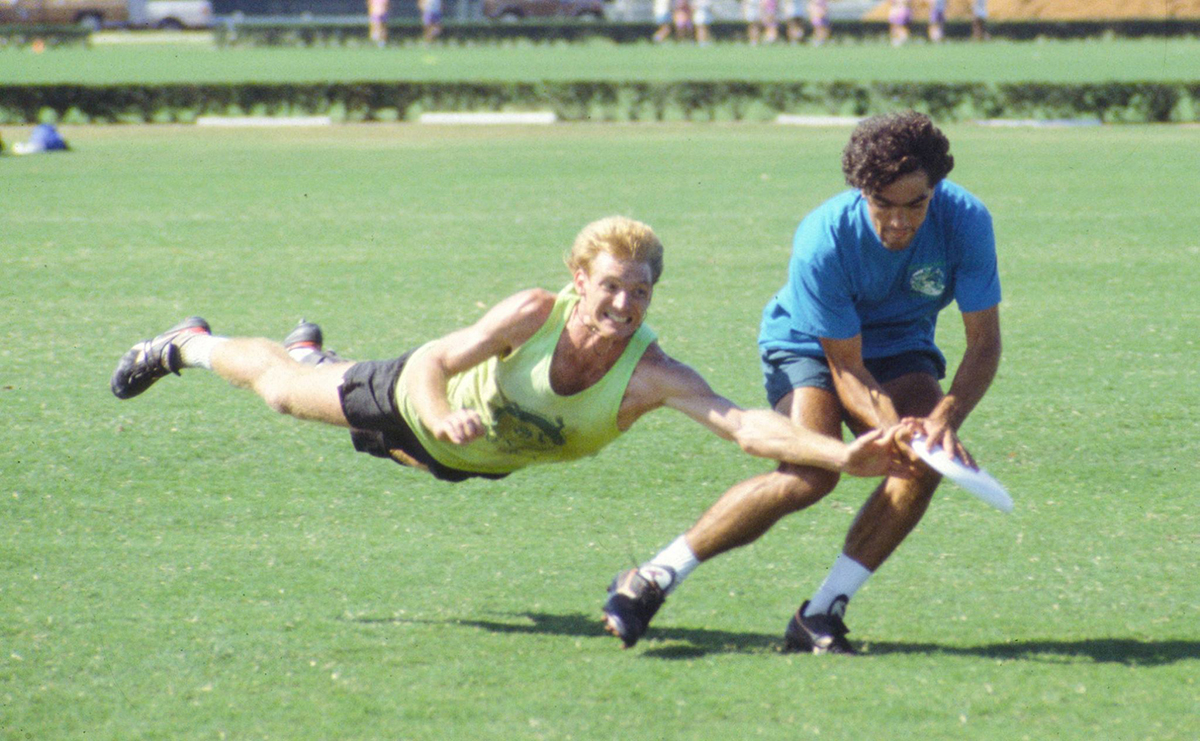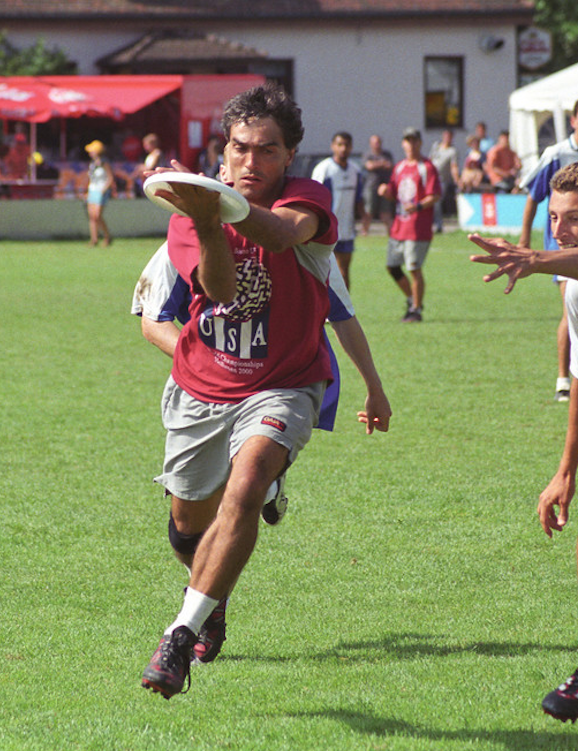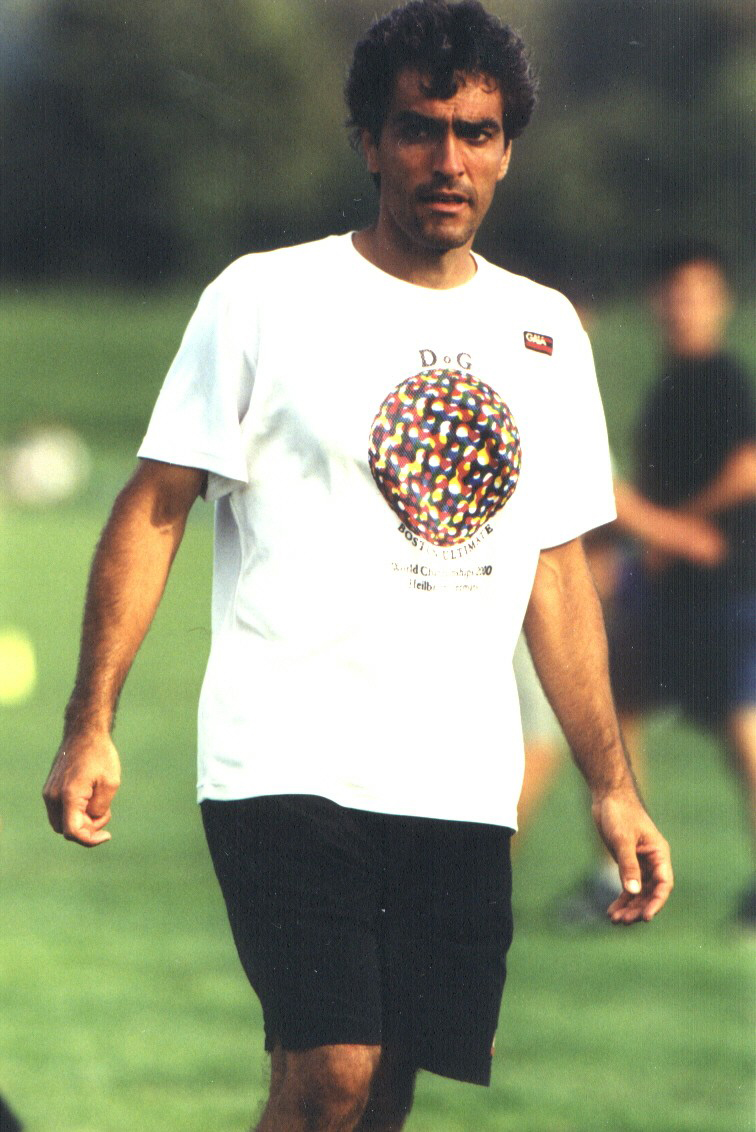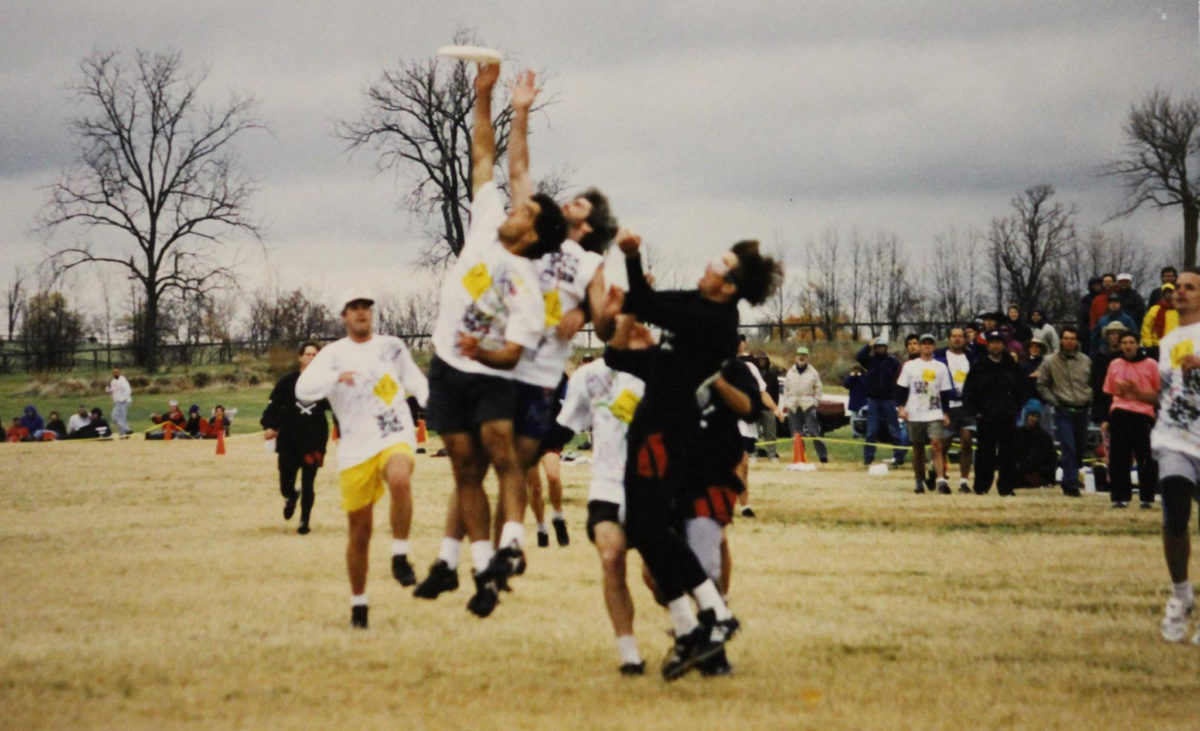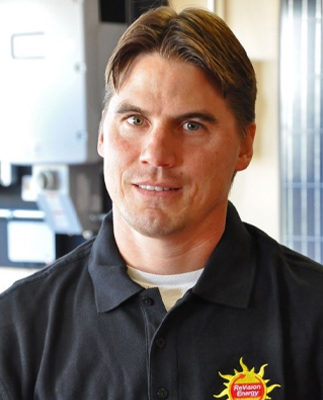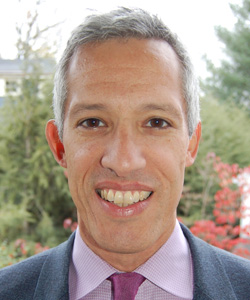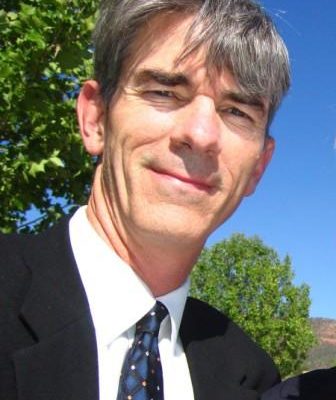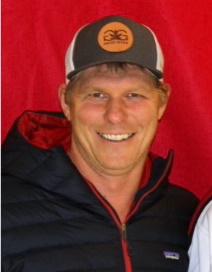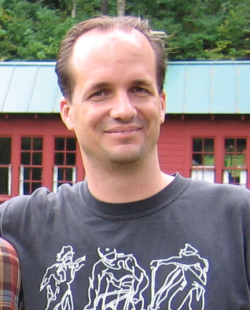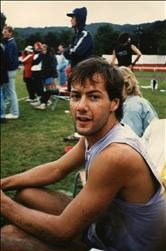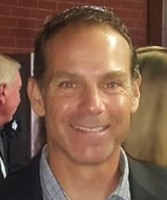Class of 2014
Jim Parinella
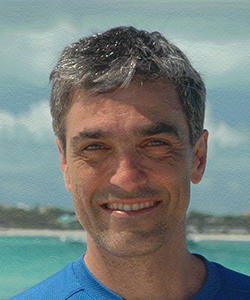
Jim Parinella
Born: 1965 (Age 59)
Career Information
Club
Masters
Great Grandmasters
National Team
U.S. National Championships
6x U.S. Club Champion (1994, 1995, 1996, 1997, 1998, 1999)
1x U.S. Masters Champion (2007)
3x U.S. Grandmasters Champion (2009, 2013, 2016)
1x U.S. Club Runner Up (1992)
1x U.S. Grandmasters Runner Up (Jim Parinella)
1x U.S. Great Grandmasters Runner Up (2019)
World Championships
6x World Champion (1996, 1999, 2000, 2008, 2011, 2015)
2x World Runner Up (1995, 2002)
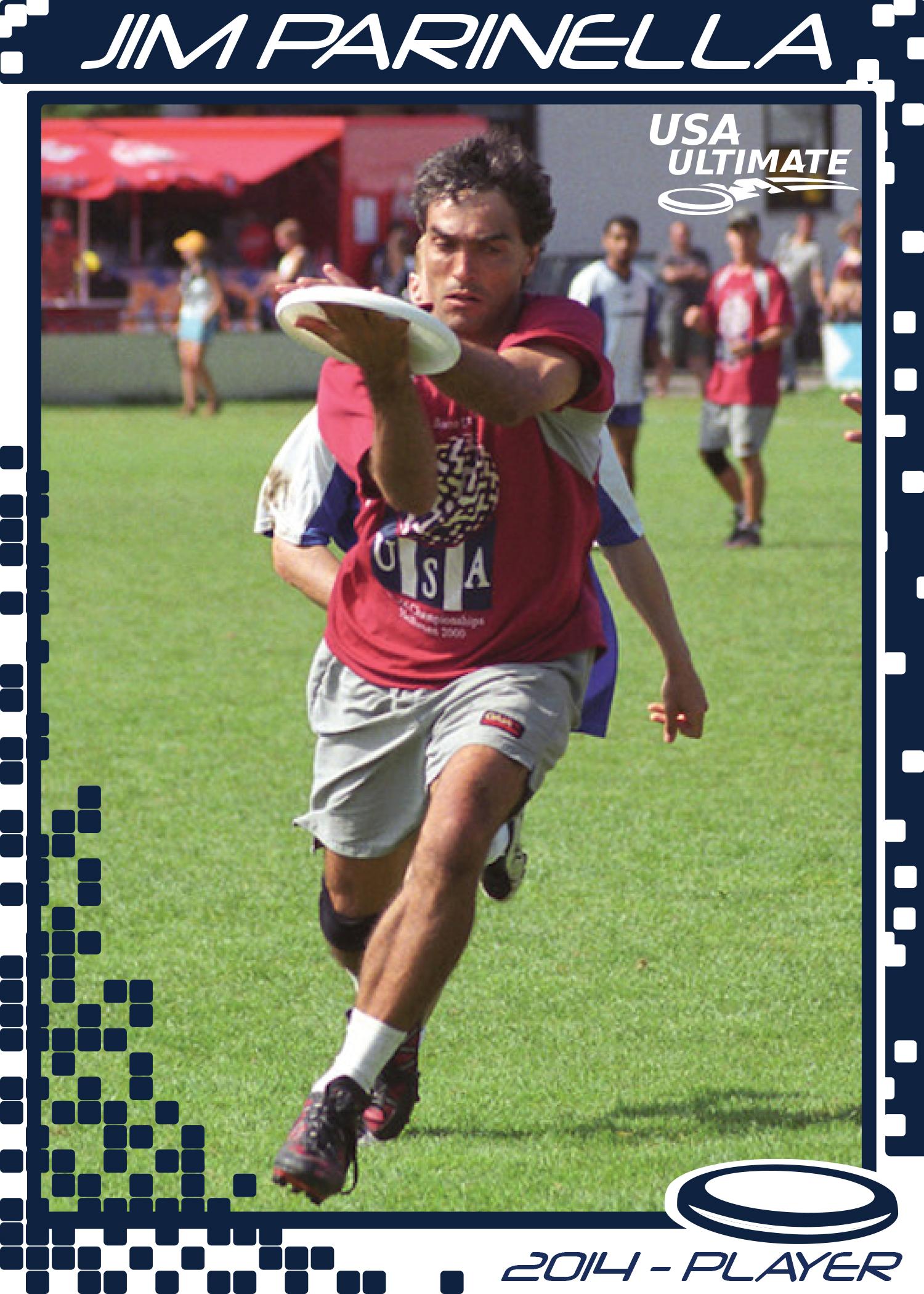
Jim’s long and storied ultimate career has been the definition of excellence, leadership, longevity and innovation. After learning the game in Pittsburgh and Cleveland, Jim first came into the spotlight while leading different contending Boston teams in the late ’80s and early ’90s, but when he helped form and lead Death or Glory in 1994, he changed the fortune of his teammates and the game of ultimate forever. A gifted athlete who simply could not be covered, Jim was also a strategic mastermind who was an integral force behind the invention of cutting-edge hybrid zones and elegant offensive formations that frustrated and conquered the best teams in the world. As an understated captain who led by doing, Jim delivered results with DoG: six straight national championships from 1994–1999 and three world titles between 1996 and 2000. Arguably Jim’s most impressive statistic is an individual one; he has played in a national championship (open, masters, grandmasters) every year since 1992 and is still going!
Contributions & Service
- 1994-Present: Wrote articles for several publications, including the UPA Newsletter on strategies and skills in ultimate. In 2004, co-wrote "Ultimate Techniques and Tactics" with Eric Zaslow, published by Human Kinetics. It is still in print and has sold over 12,000 copies.
- 1998-2003: UPA Board of Directors
- 2001-2002: UPA President
- 2001: Observer for the finals of College Nationals
Championship Tournaments
U.S. National Championships
| Year | Team | Placement |
|---|---|---|
| 1989 | Earth Atomizer Club Men | 11th |
| 1990 | Earth Atomizer Club Men | 5th |
| 1992 | Commonwealth Club Men | 2nd |
| 1993 | Big Brother Club Men | 3rd |
| 1994 | Death or Glory (DoG) Club Men | 1st |
| 1995 | Death or Glory (DoG) Club Men | 1st |
| 1996 | Death or Glory (DoG) Club Men | 1st |
| 1997 | Death or Glory (DoG) Club Men | 1st |
| 1998 | Death or Glory (DoG) Club Men | 1st |
| 1999 | Death or Glory (DoG) Club Men | 1st |
| 2000 | Death or Glory (DoG) Club Men | 3rd |
| 2001 | Death or Glory (DoG) Club Men | 3rd |
| 2002 | Death or Glory (DoG) Club Men | 3rd |
| 2003 | Death or Glory (DoG) Club Men | 5th |
| 2004 | Death or Glory (DoG) Club Men | 5th |
| 2005 | Death or Glory (DoG) Club Men | 3rd |
| 2006 | Death or Glory (DoG) Club Men | 7th |
| 2007 | DoG Masters Men | 1st |
| 2008 | DoG Masters Men | 4th |
| 2009 | DoG Masters Men | 4th |
| 2009 | DoG Grandmasters Men | 1st |
| 2010 | DoG Masters Men | 8th |
| 2010 | DoG Grandmasters Men | 3rd |
| 2011 | DoG Masters Men | 11th |
| 2011 | DoG Grandmasters Men | 5th |
| 2012 | DoG Grandmasters Men | 6th |
| 2013 | No Country Grandmasters Men | 1st |
| 2014 | No Country Grandmasters Men | 3rd |
| 2014 | No Country Grandmasters Men | 2nd |
| 2016 | No Country Grandmasters Men | 3rd |
| 2016 | No Country Grandmasters Men (Beach) | 1st |
| 2017 | No Country Grandmasters Men (Beach) | 3rd |
| 2017 | No Country Grandmasters Men | 3rd |
| 2018 | No Country Grandmasters Men (Beach) | 3rd |
| 2018 | DoG (Great Grandmasters) Great Grandmasters Men (Beach) | 3rd |
| 2019 | DoG (Great Grandmasters) Great Grandmasters Men | 3rd |
| 2019 | DoG (Great Grandmasters) Great Grandmasters Men | 2nd |
World Championships
| Year | Tournament | Team | Placement |
|---|---|---|---|
| 1991 | WUCC Toronto, ON | Earth Atomizer Club Men | 3rd |
| 1993 | WUCC Madison, Wisconsin | Big Brother Club Men | 7th |
| 1995 | WUCC Millfield, UK | Death or Glory (DoG) Club Men | 2nd |
| 1996 | WUGC Jonkoping, Sweden | Death or Glory (DoG) Club Men | 1st |
| 1998 | WUGC Blaine, MN | Death or Glory (DoG) Club Men | 3rd |
| 1999 | WUCC St. Andrews, Scotland | Death or Glory (DoG) Club Men | 1st |
| 2000 | WUGC Heilbronn, Germany | Death or Glory (DoG) Club Men | 1st |
| 2002 | WUCC Honolulu, Hawaii | Death or Glory (DoG) Club Men | 2nd |
| 2008 | WUGC Vancouver, BC, Canada | DoG Masters Men | 1st |
| 2011 | WCBU Ligano Sabbiadoro, Italy | U.S. National Team Masters Masters Men | 1st |
| 2015 | WCBU Dubai, United Arab Emirates | U. S. National Team (Masters Men) Masters Men | 1st |
Interview
What position(s) (e.g., handler, deep cutter, middle-middle) did you usually play?
Primary receiver and popper in zone O. I was both a deep threat and a possession receiver. Up to age 35, I also played a lot of D, usually on receivers or as wing or deep in the zone.
Describe your major accomplishments – both as a teammate and an individual player?
I was a key part of the DoG dynasty that won six straight national championships. We had so many great players that it’s hard to claim that any one of us was indispensable. I made Nationals 20 straight years, the last five in Masters, and made semifinals at Nationals 11 straight years. For most of those years, I played virtually every offensive point and was the first downfield cutter in the called play more than half of the time.
Why did you stand out among the elite players of your time? What was it that you did best, or were known for?
I was always able to get open with the force and I always caught a lot of goals, many of them where I was so open that I could catch them flat-footed. While I don’t have the classic “sweet throws”, I became an effective thrower, adding deep throws and break marks to my game as I matured. I was the key popper in our zone offense, which helped to redefine the way to play zone O. We became so good that teams just wouldn’t play zone against us (more than once).
What role did you play on the best (or most overachieving team) that you played on?
I was a primary downfield cutter. We had some great receivers (Chris Corcoran, Fortunat Mueller) and many good ones on a team that won 52 straight games at Nationals, so we all were called as part of the four-person play. I would both throw and catch a lot of goals.
What year was the peak of your career? During which years were you playing as the "stud" of your team? If you continued playing after your peak years, how did your role change? In what year did you stop playing at the top competitive level?
I would be hard-pressed to pick a particular year as my peak, with anytime between 1992, when I was 27 and at my peak physically, and 1998 being possible. I think my single best performance was in the 1995 Nationals. I was the first cutter on probably 75% of the points and led the team in catches in the finals (usually a handler touches the disc the most), which we won 21-10 while committing only three turnovers. Steve Mooney commented that he had a hard time finding a good picture of me from the video because there was never anyone else in the frame when I was catching it. As late as 2002, when we came close to winning both Worlds and Nationals, I was still capable of carrying the team on occasion. From 2000 (when I was 35) to 2006 (my last year in open), I played almost exclusively on the O line and became more of a possession receiver (and occasional handler, especially near the goal line) rather than a deep threat.
Why do you believe you are worthy of being inducted into the Ultimate Hall of Fame?
I had a very long career with a prolonged peak that placed me as one of the top players in the game for a number of years. I was a versatile player who had great field sense.
